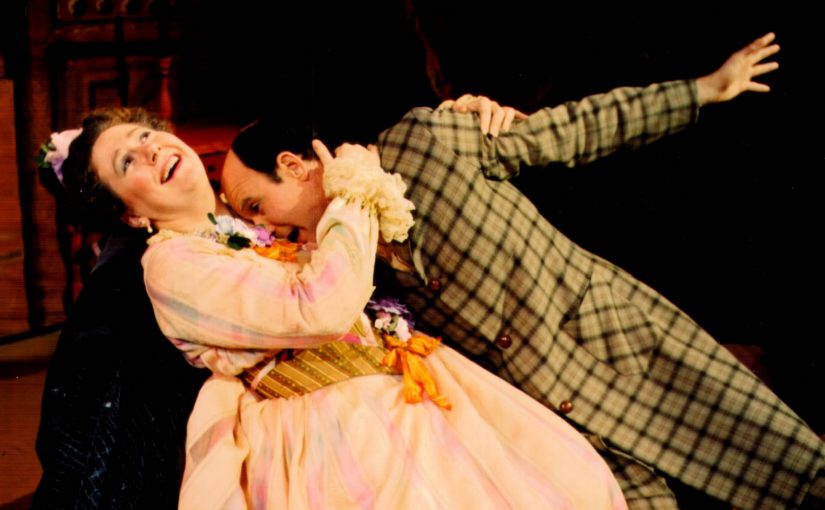Readers have been clamoring for this critic to publish an update on that unlikely hit, The Cavalcade of Symptoms, PD Edition (producer, director, playwright, and most reliable spectator, David Zarko). I’ve been resisting, having seen (and reviewed) the show several times since its very quiet off-off-off Fringe premiere in 1998. But despite my well-known distaste for pressure from the reading public, my sense of the ridiculous prevailed and today I revisited the spectacle.
A famous quip by Haywood Broun springs to mind: “The play opened at 8:40 sharp and closed at 10:40 dull.” The sentiments expressed by Mr. Broun generally apply, here. There are, however, caveats. Many of them, in fact, but I shall limit myself to two.
One, the play never opens sharp at any time of the day, it rather sneaks up on you. The curtain always rises without warning, catching everyone off guard, sometimes embarrassingly so. What’s more, there is no telling how long a performance will last, nor what acts may be featured.
Two, it closes as spontaneously as it opens. Just when you think the performers have finally found some pizzazz, the lights dim, the curtain falls, and the music ceases, leaving Mr. Zarko – and whomever else may have wandered in to watch – in the dark and peacefully bewildered.
It’s hard to imagine in its present state, but The Cavalcade of Symptoms was going strong as recently as July. Back to back shows all day from wake to sleep (except for naps) kept the producer busy and guaranteed a brisk turnover. There were The Goofies and The Slows doing their famous semi-comic dance routines that always seem a little inebriated (and often are). There were the ever-popular Hoarse Whisperer and his sidekick, Little Miss Malaprop. There were the co-stars Tremor Rightly and Rightly Claw, symptomatically conjoined twins, and the bill was suitably rounded out by Shamus Shuffler and the Four Stumblers. Those and a host of supernumeraries – it was quite a show. But its glory days are waning.
I spent all day as a spectator, endeavoring to observe in as unbiased a manner as possible (especially as Mr. Zarko was always present, and frequently looking my way – I suspect out of boredom) so I could present an accurate report. The Goofies are as ridiculous and disorienting as ever, but take and leave stage with no pattern whatsoever. And as their partner team, The Slows, seldom show up at all, expectations fall on the Rightlies to take up the slack. Tremor is clearly losing his spunk. He wanders on, shakes for awhile, takes a nap, disappears. (The stage manager was several times seen crossing back and forth looking for him, calling his name with increasing irritation.) Claw is only reliably entertaining when Mr. Zarko has grown so restless as to pace between rows, but even then she lacks the old spirit, only does what she has to (according to contract?) and without commitment.
Hoarse Whisperer and Little Miss Malaprop were never really of star quality to begin with, nor are they disciplined performers, but at least when they’re on, they’re on. They come from a different angle each entrance (kudos for creative staging); from stage right, stage left, flown in on pipe three, swung in on a loose line, down the center aisle, up through a trap door. Sometimes they’re in the spotlight, other times upstage in shadow. They show up for cameos lasting no more than thirty seconds, and deliver soliloquies that seem to go on forever. I have to applaud their unflagging commitment to giving the spectator his dollar’s worth.
Shamus Shuffler and his close-harmony backup group, however, start strong but you can rely on their losing energy ten or fifteen minutes into the act. Shamus shuffles and weaves like a pro at first, but soon loses concentration, drifts, and eventually abandons all effort at disambulation, especially when faced with a downwards hill. The Stumblers, deprived of a strong lead, chime in randomly with an equally random riff or two, but may as well retire.
The supernumeraries are a chaotic, directionless mess. They come and go as they please, often leaving the theatre for days at a time. Were I Mr. Zarko, I’d can the lot of them.
I spoke to Zarko during one of the longer periods of the performers’ mystifying inactivity. He’d like to close the show, but says there are contractual arrangements he’s been unable to break. A friend Down Under is looking into loopholes and alternatives, a union rep near Allerona (Italy) has been trying to negotiate a clean closing (that she ominously implies may involve eradication of “certain parasites”), and a local singer/composer has been prodding and poking at the acts, trying to make his point that sticking around for their pathetic paychecks is not worth the damage done to their reputations. All the while a Slovakian cartel has been threatening to “kick their a**es outa da ballpark”. Zarko is seriously considering the offer.
But momentum is a great sustainer, and even as its influence wanes, the company still adheres to the maxim “the show must go on.” And on, and on, and on.
I ask Zarko why he doesn’t let the performers run out of steam on their own, suspend their pay, neglect the bills, and leave the theatre. He looks stunned. “What, and give up show business?”
